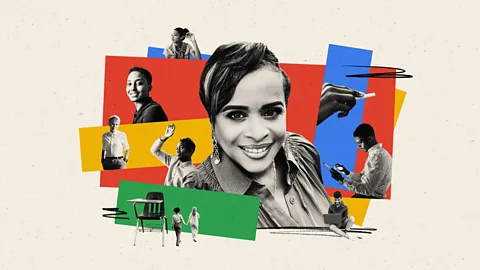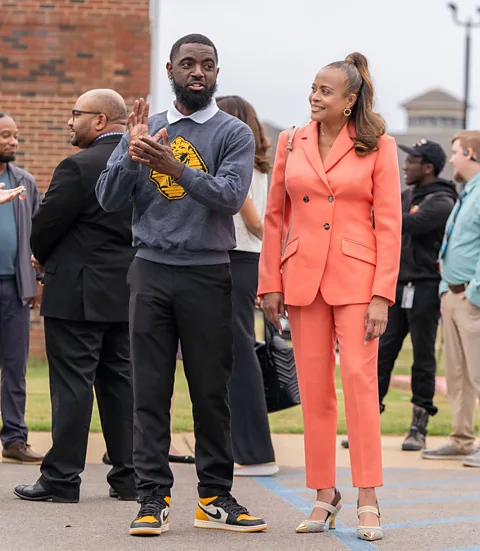How Google is sticking to – and soaring past – its DEI goals
 Klawe Rzeczy
Klawe RzeczyMelonie Parker, Google's chief diversity officer, enters the BBC's Executive Lounge to talk about "re-recruiting" top talent, and building something bigger than yourself.
Commitments to diversity, equity and inclusion (DEI) are forward-looking investments for companies. Research consistently shows embracing diversity makes companies more innovative – and ultimately more profitable.
In recent decades, many global companies launched new initiatives to improve their DEI efforts, bringing in new executives and bolstering their hiring of diverse candidates. However, the landscape shifted in 2022, when many tech companies made significant cuts and downsized DEI programmes. In many cases, workers of colour were among the first affected by layoffs.
Despite these changes, Melonie Parker says Google remains firm in its racial-equity commitments, which include increasing underrepresented groups in leadership by 30% by 2025, and addressing representation issues in hiring, retention and promotions.
Parker, a "Googler" since 2017, is currently the company's chief diversity officer. She has nearly three decades of expertise in human resources, talent acquisition and DEI, and is at the forefront of Google's endeavours to attract and retain more talent from underrepresented groups. Her leadership emphasises using data-driven research to support the company's initiatives.
In the first two years in her role, Parker and her team increased the annual percentage of black hires within the US, from 5.5% in 2019 to 9.4% in 2021. Similarly, Latino US hires rose from 6.6% to 9.0% during this period. As a result, 2021 was Google's largest percentage of new black and Latino hires in the US. Additionally, women currently account for 32.6% of Google's global leadership – an increase of 5.9% since 2019.
"I'm really proud of the way I've been able to grow the work here, specifically of how we deepened the DEI work following the murder of George Floyd," Parker tells the BBC. "We're taking an enterprise-wide approach in our five-year racial equity goals, looking at our milestones on a continual basis and reporting it out annually to allow for transparency internally and externally. This way, our partners, users, creators and workforce are not only aware of the progress we're making, but also are able to participate."
Parker believes in building a workforce that reflects the diversity of its users and the global community. She discusses her leadership role, the challenges she has faced and lays out an actionable plan for all leaders.
Executive Lounge
The BBC's series features interviews with executive leaders making innovative, data-driven decisions helping shape the future of business – and paving the path for other leaders to thrive. Read more conversations here.
What about your background led you to Google?
I spent the bulk of my career in aerospace and defence, and I wanted to take on a different set of challenges. What I looked for coming into tech was, "how do I use my experiences to bring other people along?". I was able to do that successfully in aerospace and defence, and I wanted to do that in tech, because I knew the beginnings of tech weren't as inclusive as we aspire to. I was ready to do something bigger than myself.
The way I approach my life and my career is – it's not about me. It's about the greater "we" and about who I'm serving. I grew up service and purpose minded, and I'm very grounded in my personal values and principles that my parents poured into me.
My parents marched with Dr Martin Luther King; my mom was the first black bank teller in my hometown of High Point, North Carolina; my brother and I are first-generation college graduates; and I'm now the first in my family in corporate America. I navigated a career where I've been the only one and I've looked around and not seen many people like me, but in spite of that, I continue to be successful in both my career and in bringing others along. I parlay these experiences to help make tech more inclusive.
How have you helped increase Google's diversity hiring?
In 2020, the team set five-year goals, and we've achieved 60% of those goals. This year, I want to reach the 80% milestone and close more gaps as we march towards 2025. This includes our global racial equity commitments.
There's a lot of opportunity to make progress. It requires continually assessing approach, practice and programmes to make sure we're providing solutions to challenges that come at any given time. We use data to understand where we have gaps to parity, and we're then able to set goals and rally the company in ensuring we make progress in those areas. Everything I've done and the work I've led has been completely powered and informed by data.
We also open source this data using BigQuery so other leaders can use it to inform their own strategies. One thing I say about Google is that we're leaders and we're learners, and we do both transparently to make sure we're also using what we learn to help others.
That's how I'll continue to lead and how we'll continue to make progress as a company – with the leadership commitment we have from our CEO on down.
 Courtesy of Google
Courtesy of GoogleIn recent years, a number of global companies announced major cuts to their DEI teams. What would you say about prioritising DEI?
There are a set of critical questions that help open one's mindset and encourage leaders to take a step back and think more broadly about what is needed to ensure their companies are successful. I would start by asking leaders, as you think about the talent within your company, do you see talent as an expense or as an asset?
If you see talent as an asset, what do you think your talent needs to ensure your company is not only successful, but profitable? Not just experiences or competencies – but what conditions do people need to bring their best selves to your company every day?
The recipe for ensuring a business is the most successful is having people who feel included and like they belong at a company.
I come into these conversations looking for shared meaning. We all have shared meaning around people being treated fairly and having fair outcomes. That's a place where we can all agree. Everyone has an experience where they felt excluded or treated unfairly and as leaders, we wouldn't want anyone to feel that way. I leverage this shared meaning to help influence people on what actions they can take as leaders to ensure inclusive environments, products and services.
My advice is for leaders to recognise who is not included at their company and to ensure their workforce reflects the talent that is available externally.
How can leaders better retain diverse talent?
Leaders should re-recruit their talent every day – remind people of why they're there. We do that by investing in their career development and really examining the culture of the company to make sure it's fair and supportive for everyone.
Research also says that in order for people to feel like they belong, they have to feel supported, recognised, valued and rewarded. So, when people do something well, give them good feedback right away. You can't wait for the performance appraisal. Conversely, feedback for improvement should be timely as well so people understand what they need to do to be successful.
People don't always remember or even recognise how their role helps them personally contribute to the company's broader mission – remind them. A simple principle is, gratitude is important. Before you finish work each day, find at least one person to thank for something they did. Send a quick email or text to let them know.
If leaders can remember to re-recruit their talent each day, people would have a different experience.
What challenges have you faced being a DEI leader at a global company and how have you overcome them?
One of the biggest challenges in a global workforce is ensuring our strategy is truly global to the point where our workforce worldwide sees themselves reflected in our DEI strategy. This requires having a learning mindset so I'm always reading, researching, studying, and talking to people to learn more.
Also, because we're still growing our presence in corporate America, when I enter spaces and there are few or no black women, this can be challenging as well. What I've learned for this particular challenge is I don't put labels on myself. I don't walk in the room as the black woman. I walk in as Melonie. That's my own mental model and the story I'm telling myself is, I'm in that room as well-equipped to add my expertise and experience as anyone else. And I think recognising this is important.
I also remember that even though I might be the only black woman in a space, there are people who have been there before me and people who will be there behind me. So, I can't let not visibly seeing it in the room make me believe I'm the only one. We have to remember the people who have come before us and draw on that strength. I remember my parents who marched with Dr Martin Luther King in the 1960s and fought for me to be in spaces like this.
Google by the numbers
What do you want your legacy to be? How does your current role align with your greater purpose in life?
I'm a new GiGi, and as I think about my granddaughter's future and the legacy I want to leave behind for her and others, it's clear that a life of purpose and service is the foundation for my legacy. I truly believe we're called to leave the world a better place than we found it. So, my legacy will be that in some way, I left the world a better place.
My role as chief diversity officer provides me with a stewardship opportunity to serve others through the progress we're making at Google uplifting communities, and the guidance we provide to other organisations. This role allows me to create the legacy that I want to leave for my granddaughter and the world.
How has your leadership style and career goals evolved as a global DEI leader?
Early in my career I 'code switched'. I checked parts of my identity at the proverbial door so that I could fit into the environment. As I matured and grew more confident, I recognised I couldn't do that. I have to bring the best of who I am to work.
I don't code switch anymore. I ensure I'm honouring all the parts of my identity that make me who I am, and also make me uniquely qualified to lead diversity equity and inclusion at Google. I don't overlook or mute parts of myself.
I bring all of me in service of the role, our internal workforce and external community.
This interview has been edited and condensed for clarity
